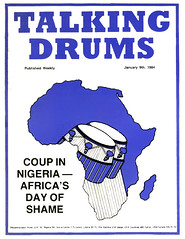No Compromise On New Information Order
Ben Mensah
It is a conflict in which neither side is ready to compromise. The establishment of a Pan African News agency by the O.A.U. is an indication of the determination of African politicians to forge ahead with the new information order.THE United States of America has decided to withdraw from the United Nations Educational Scientific and Cultural Organisation (UNESCO) at the end of the year and of all the reasons cited, the most controversial undoubtedly is the concern over efforts to establish a New Information Order.
Most of America's allies who regret the Reagan Administration's decision, however, agree with the Americans that the new information order being sought by the Third World countries is a threat to the freedom of the press as far as it seeks to restrict the work of foreign correspondents.
With the bulk of the world news transmitted through such international news agencies as Reuters, Agence France Presse, Associated Press and United Press International which are French, American and British it is natural for these countries to resist any attempts to overturn the status quo of the media front.
In the view of the US and other Western nations the so-called new information order merely presents governments particularly in the Soviet block and Third World to control what is written about their countries both inside and outside their borders.
But governments of these Third World countries have also not hesitated to show their displeasure at what they term 'negative' reports put out by the Western media. They regret that while their development projects never get mentioned only calamities such as coups d'etat, assassinations, earth quakes and other bizarre stories are given attention.
It is a conflict in which neither side is ready to compromise. The establishment of a Pan African News Agency by the Organisation of African Unity is an indication of the determination of African politicians to forge ahead with the new information order.
Certainly, if the advent of PANA is to eliminate the technical problems facing African journalists so that a Ghanaian journalist covering an event in nearby Togo would no longer have to route his stories through Paris and London before reaching Accra then the Western countries would have to review their attitude towards the projected new information order.
In that context the United States and other Western countries would be asked to help with communication facilities so that African journalists can provide a healthy competition to the western correspondents.
But sadly the indications are all gloomy. And PANA itself would sooner than later grow to discover that it is on a collision course with African leaders for daring to publish news which they may consider distasteful.
For not long ago a publication in a Sierra Leone newspaper about the Liberian Leader Dr Samuel Doe created a diplomatic row between the two neighbouring countries which nearly resulted in a break in diplomatic relations.
Around the same time a publication in Senegal about President Jawara of Gambia was considered distasteful by the Gambian authorities who banned its circulation in their part of the Senegambia confederation.
These incidents and a lot more which are yet to unfold portend a very bleak future for PANA indeed.
In the meantime the readers and listeners of the major international news agencies will continue to dictate to the journalists the type of news they want to read.
And since the whole process of informing the public in the western world is considered a commercial venture President Reagan and his allies will also persist in their insistence that foreign correspondents are in no way restricted in their work.
UNESCO the forum where the new information order is being pursued was therefore destined to be criticised by the West and since it has not modified its position the United States has had to withdraw to deprive the organisation one quarter of its annual budget
